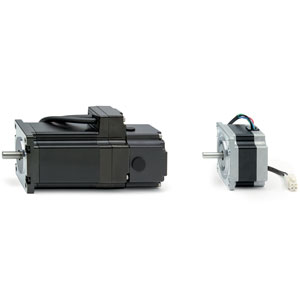Motors
Electric motors are devices that convert electrical energy into mechanical energy, utilising the principle of electromagnetism. There are various types of electric motors, including synchronous and asynchronous motors, each with specific characteristics suited to various industrial and commercial applications. Synchronous motors use permanent magnets or electromagnets to synchronise the rotation speed with the frequency of the power supply current. Asynchronous motors, however, rely on a rotating magnetic field that induces movement without the need for permanent magnets, making them more robust and suitable for heavy-duty working conditions.
Added to Your Shopping Cart
Servo Motor
A servo motor is a precision device used for accurate control of position, speed, and torque. It consists of an electric motor, a position sensor that provides the necessary feedback for precise control, and a control circuit that regulates the motor's operation based on command signals. These motors are essential in applications where precise and highly dynamic movements are required. With their high dynamism and precision, servo motors are ideal for tasks requiring detailed movement management and a rapid response to control commands.
Optimisation with Integrated Drives
Optimising motors with integrated drives results in significant energy efficiency and improved motor control management. This technology allows for closer integration between the motor and control components, leading to more compact configurations and reducing excessive wiring and overall system complexity.
Advanced Actuation with Linear Electric Cylinders
Combining the functionalities of electric cylinders with electric motors, linear electric cylinders represent a perfect blend of strength and precision. These cylinders are the preferred choice for their flexibility and ability to quickly adapt to meet complex production challenges.
Stepper and Brushless Motors
Brushless motors (BLDC) are known for their high energy efficiency. Because their design eliminates brushes, these motors reduce friction and energy dissipation, resulting in greater operating efficiency. BLDC motors are ideal for applications requiring high speeds and continuous operation, such as electric vehicles and industrial equipment that operate for extended periods without interruption.
Stepper motors can be less efficient than BLDC motors because they consume current even when stationary, however they provide precise control of positioning and speed even in an open loop without needing feedback. Using advanced control techniques such as micro-stepping and efficient motor drivers can significantly improve the efficiency of stepper motors.
Product Availability by Store Location
Hours
 Poland
Poland



